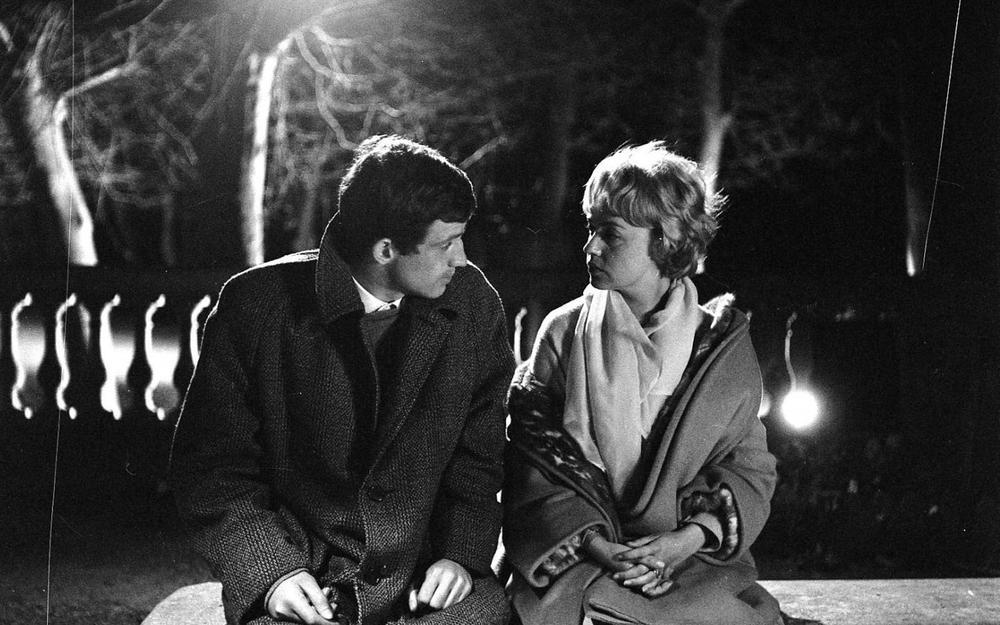Moderato Cantabile (1960), directed by Peter Brook and adapted from Marguerite Duras’ novel, is a hauntingly evocative film. Delving into the themes of desire, alienation, and the unfulfilled longing of bourgeois life. The film is a rich, moody piece of French cinema, showcasing a quietly intense performance by Jeanne Moreau. A minimalist, reflective visual style that explores the undercurrents of passion and constraint. Set in a small provincial town, Moderato Cantabile is less about the plot and more about exploring complex emotions. Revealing the inner turmoil of characters trapped by social norms and personal dissatisfaction.
Plot Overview: A Murder Sparks a Fascination
The story follows Anne Desbaresdes, a beautiful but disenchanted bourgeois woman who leads a monotonous life with her young son in a small coastal town. During her son’s piano lesson, they hear a woman’s scream from a nearby café, where a man has just murdered his lover. The murder becomes an obsession for Anne, who is drawn to the café and to Chauvin. A factory worker who claims to have known the murdered woman.
As Anne and Chauvin engage in ambiguous, repetitive conversations about the murder, an attraction begins to simmer between them. Their relationship remains ambiguous, clouded by silence, innuendo, and unresolved tension, but it is charged with an underlying intensity. The film lingers on their interactions, making the space between words and actions as important as the dialogue itself. Mirroring the restrained but palpable passion of a slow waltz—”moderato cantabile.”
Jeanne Moreau’s Mesmerizing Performance
Jeanne Moreau’s performance as Anne Desbaresdes is the emotional anchor of Moderato Cantabile. Known for her nuanced portrayals of complex, often tragic women, Moreau brings a raw intensity and a sense of yearning to Anne’s character. Her subtle gestures, haunted expressions, and carefully controlled body language convey Anne’s unspoken desires, making her emotional conflict feel almost tangible.
Moreau’s Anne is at once fragile and defiant, embodying a woman who outwardly conforms to societal expectations but is inwardly seething with discontent. Her chemistry with Jean-Paul Belmondo, who plays Chauvin, is understated yet electric; their interactions are fraught with tension, as they circle each other, drawn together by a mutual fascination with the murder and, perhaps, with each other. Moreau’s portrayal earned her the Best Actress award at the Cannes Film Festival, a testament to the depth and subtlety of her performance.
Setting and Cinematography: A Reflective Coastal Landscape
Moderato Cantabile is set against the backdrop of a quiet coastal town, a place where the routine of bourgeois life is carefully maintained. The seaside, muted colors, and minimalist interiors mirror the bleakness and isolation felt by the characters. Director Peter Brook and cinematographer Armand Thirard use the landscape to amplify the sense of emptiness in Anne’s life. The town, like Anne herself, appears beautiful but stifled, a place where passion simmers beneath the surface yet never finds release.
The cinematography is understated, relying on natural light and framing that accentuates the tension between the characters. Long, contemplative shots capture the silence and space between Anne and Chauvin, enhancing the sense of suspense and repression. Brook’s direction creates a visual language that feels poetic, inviting the viewer to focus on the atmosphere and emotional resonance rather than overt action.
Themes: Desire, Alienation, and the Constraints of Society
At its core, Moderato Cantabile is an exploration of desire and societal constraint. Anne’s fascination with the murder symbolizes her yearning for an escape from the confines of her privileged but suffocating existence. Through her connection with Chauvin, she finds a temporary release from the rigidity of her role as a wife and mother, discovering something raw, dangerous, and authentic. However, their connection is fleeting and inconclusive, highlighting the futility of her search for fulfillment within the confines of societal expectations.
The film also explores class disparity, as Anne’s bourgeois lifestyle contrasts sharply with Chauvin’s working-class background. Their relationship is strained not only by unspoken passion but by the realities of their different worlds. In a society divided by class and rigid norms, their connection can only exist in the shadows, making their encounters charged with forbidden allure.
Duras’s novel and Brook’s adaptation both emphasize the “moderato cantabile” style, a musical term meaning “moderate and singable.” This reference suggests a subdued, controlled passion that reflects Anne’s life—her desires are present but subdued, her longing voiced but never fully articulated. The pacing and rhythm of the film mirror this concept, with dialogues that repeat and conversations that never quite lead to resolution.
Impact and Legacy
Moderato Cantabile holds a special place in French cinema, particularly as an early example of literary adaptation that captures the essence of Duras’ complex, layered storytelling. Though minimalist in its narrative approach, the film is rich in emotional subtext and visual symbolism, inviting viewers to read between the lines and interpret the characters’ unspoken desires and internal conflicts.
While not as widely recognized as other French New Wave films, Moderato Cantabile is celebrated for Jeanne Moreau’s brilliant performance and its haunting exploration of the emptiness within conventional roles. Moreau’s portrayal of Anne remains one of her most acclaimed performances, and her nuanced, introspective approach paved the way for more character-driven cinema in the 1960s and beyond.
Ultimately, Moderato Cantabile is a meditative study of the human heart, trapped between societal expectations and the need for authenticity. It invites viewers to contemplate the nature of unfulfilled desire, suggesting that the most profound connections are often those that are never fully realized. As such, the film endures as a hauntingly beautiful, introspective work that resonates with anyone who has experienced the ache of longing and the weight of societal constraint.
Watch the movie on Movieitaly+
Read more over here!






